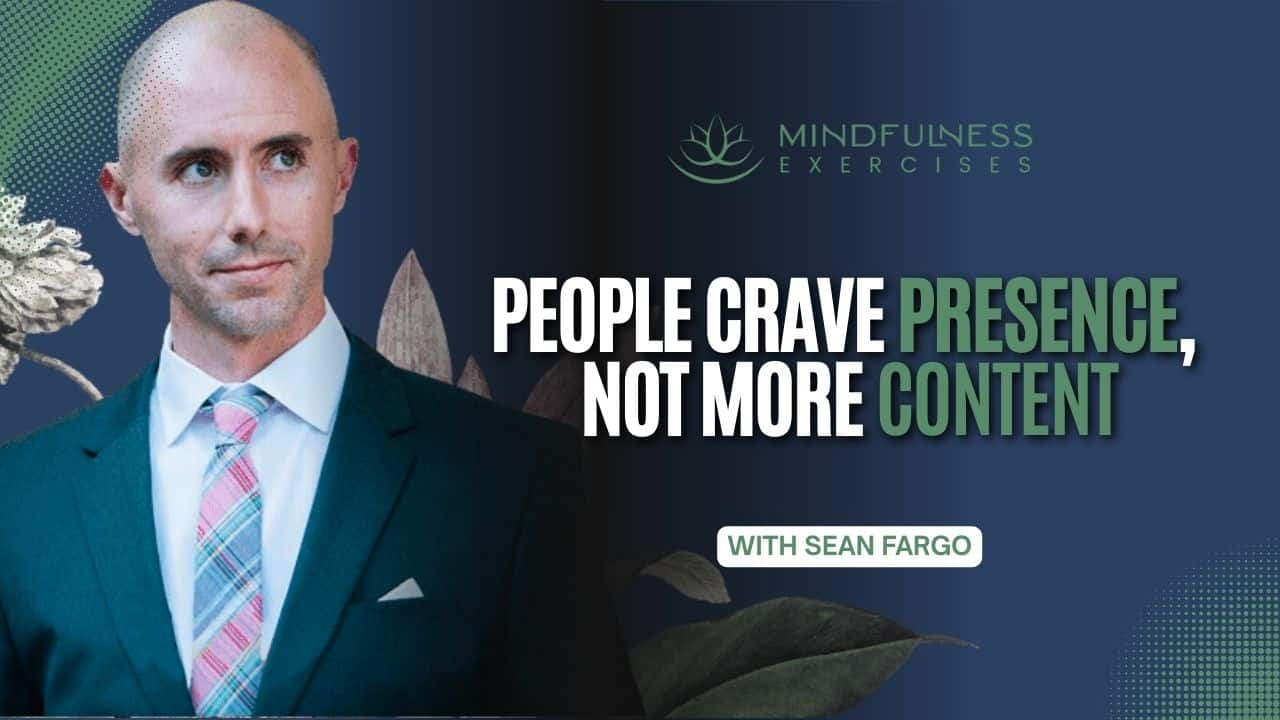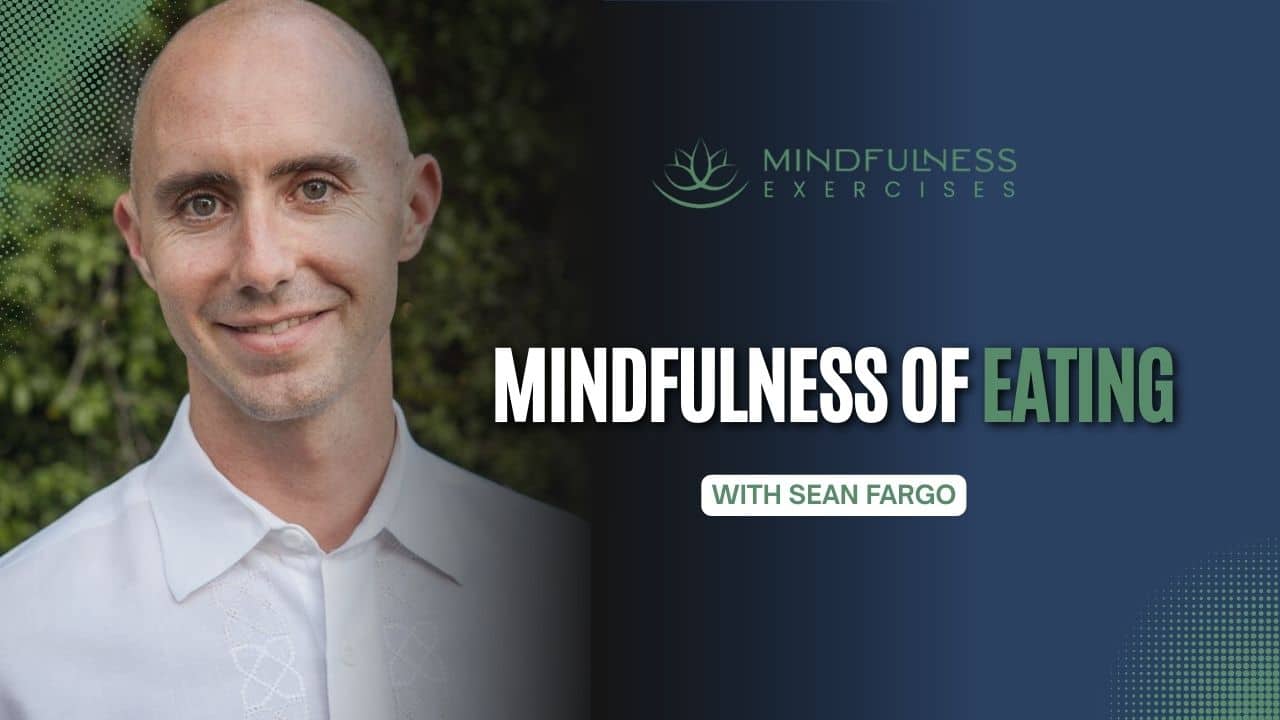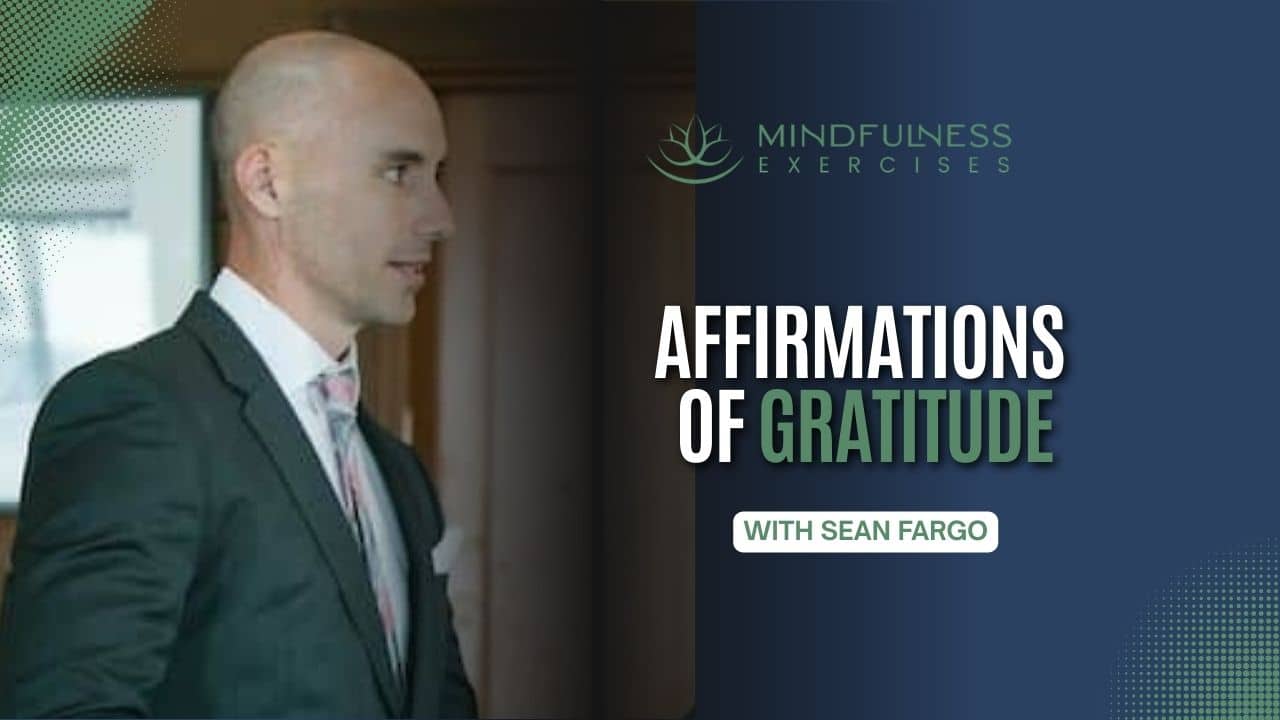In this episode of the Mindfulness Exercises Podcast, Sean Fargo sits down with Rosalie Dores – mindfulness teacher, supervisor, trainer, Insight Dialogue retreat teacher, and Work That Reconnects facilitator – to explore what it truly means to stay present with each other in a rapidly changing world.
Together, they trace Rosalie’s journey from a “bootcamp-style” Vipassana retreat in India to her master’s training at Bangor University, her love of relational mindfulness and Insight Dialogue, and her deep commitment to teaching with integrity using tools like the MBI-TAC. They also explore grief, climate crisis, imposter syndrome, and the power of community through In Good Company and The Work That Reconnects.
This conversation is especially supportive for mindfulness teachers, therapists, coaches, and serious practitioners who:
- Want to deepen embodiment and relational presence
- Feel pulled to respond to social and ecological crises
- Struggle at times with imposter syndrome, doubt, or overwhelm
- Are curious about Insight Dialogue and the MBI-TAC framework
Sponsored by our Mindfulness Meditation Teacher Certification Program
certify.mindfulnessexercises.com
Episode Overview
- How a 10‑day Goenka Vipassana “bootcamp” retreat sparked Rosalie’s lifelong commitment to meditation
- Why learning to stay with unpleasant sensations changed her practice and her life.
- How her master’s training at Bangor University shaped her as a mindfulness teacher and supervisor.
- What Insight Dialogue is, and how relational mindfulness complements silent practice
- Practical glimpses of Insight Dialogue guidelines like Pause, Relax, Open and Speak the Truth, Listen Deeply
- How the MBI‑TAC (Mindfulness‑Based Interventions: Teaching Assessment Criteria) supports integrity and confidence in teaching
- Ways relational practice helps us meet loneliness, shame, and difference with compassion – including a nod to the UK’s “Minister for Loneliness” initiative.
- How The Work That Reconnects helps us face ecological grief and global uncertainty without shutting down.
- The importance of ongoing community through spaces like In Good Company, The Mindfulness Project, and the Connect Community for mindfulness teachers.
Show Notes:
From Goenka “Bootcamp” to a Lifelong Path
Rosalie’s introduction to meditation came through a 10‑day Goenka Vipassana retreat in India. Friends told her it would be “life‑changing.” They were right.
The retreat included long periods of sitting without moving, a strong emphasis on not reacting to pleasant or unpleasant sensations, and an intense schedule that she describes as a kind of bootcamp for the mind and heart.
The key insight she carried forward:
When we stay with unpleasant sensations and watch them change, we discover that everything is impermanent. We don’t have to act out every time discomfort arises.
That experience convinced her that meditation wasn’t just a nice idea – it was a path for reducing suffering. She continued to practice Vipassana for over a decade before moving into broader mindfulness and relational approaches.
Finding a Home at Bangor University
Later, Rosalie enrolled in the Master’s in Teaching Mindfulness‑Based Approaches at Bangor University. She describes arriving at the first module and feeling like “a fish in water” – finally among people equally passionate about practice, pedagogy, and the science of mindfulness.
Her training at Bangor included:
- Deep dive into MBSR/MBCT pedagogy
- Emphasis on embodiment and inquiry
- Early exposure to the MBI‑TAC as a map of competent teaching
She went on to become an associate teacher and trainer with both Bangor’s mindfulness centre and The Mindfulness Network, where she now teaches, supervises, and assesses mindfulness teachers.
Embodiment: Teaching Mindfulness from the Inside Out
From the beginning, Rosalie sensed that good teaching is felt, not just delivered. She talks about the difference between:
- Performing mindfulness (saying the right words)
- Embodied mindfulness (allowing the practice to shape tone, pacing, and presence)
Her own practice is deeply somatic: decades of yoga, movement work, Insight meditation and Focusing – all of which inform how she sits, speaks, and listens as a teacher.
In the conversation, she and Sean explore how embodiment:
- Builds trust and psychological safety in the room
- Helps teachers model kindness towards difficulty, not just talk about it
- Supports working with shame, doubt, and imposter syndrome when they arise in teaching situations
If you’re a teacher, Rosalie’s reminder is simple but radical:
Let your body be part of your curriculum. Students learn as much from your way of being as from any script.
What Is Insight Dialogue & Relational Mindfulness?
A major thread of this interview is Rosalie’s love of Insight Dialogue, an interpersonal meditation practice developed by Gregory Kramer that integrates:
- Meditative awareness
- Buddhist wisdom teachings
- Our natural human relatedness
Instead of practicing only on the cushion, Insight Dialogue invites us to sit in pairs or small groups and meditate through dialogue using guidelines such as:
- Pause – remembering awareness before speaking
- Relax – softening bodily tension
- Open – to internal and external experience
- Speak the Truth & Listen Deeply – letting speech and listening be part of the practiceRosalie shares a simple example from the practice: two partners reflect on a pleasant interaction they’ve had with another person. Each pauses, senses their body, and speaks slowly while the other listens in silence – then they switch roles.
What’s striking is the way ordinary stories become doorways into profound insight when held in mindful dialogue.
🌐 Learn more about Insight Dialogue
Relational Mindfulness in Everyday Life
Sean and Rosalie consider how relational mindfulness shows up outside retreat contexts:
- In families, it can soften reactivity and invite curiosity instead of escalation
- In workplaces, it supports slower, wiser conversations where people feel heard
- In communities, it becomes an antidote to polarization and othering
Rosalie notes that we live in a time where loneliness is at epidemic levels. The UK even created a ministerial role dedicated to addressing loneliness, reflecting concern that isolation is harming public health.
Relational practices like Insight Dialogue offer a way to:
- Re‑discover that we belong
- Practice being present with difference
- Experience connection as a living, breathing practice, not just a concept
Working with Imposter Syndrome as a Mindfulness Teacher
At one point, Sean names something many teachers feel: Who am I to teach this?
Rosalie acknowledges that imposter syndrome shows up for her too. Rather than trying to eradicate it, she suggests we:
- Recognize imposter thoughts as just more weather passing through awareness
- Return to the mystery of being alive – the simple fact that we’re being breathed right now
- Remember that teaching is a shared learning process, not a performance of perfection
She emphasizes that students don’t need a flawless teacher. They need someone honest about the human condition, willing to model humility, embodiment, and genuine curiosity.
Teaching with Integrity Using the MBI‑TAC
Rosalie and Sean discuss the MBI‑TAC (Mindfulness‑Based Interventions: Teaching Assessment Criteria), a framework used internationally to support fidelity and competence in MBSR/MBCT and related programs.
Rosalie has used the MBI‑TAC extensively as an assessor and supervisor. She appreciates how its six domains (e.g., coverage of themes, guiding practices, relational skills, embodiment, holding the group) provide:
- A shared language for teachers, supervisors, and trainees
- A map for reflective practice instead of a pass/fail judgment
- A reminder that teaching is a whole‑person process, not just a set of techniques
She offers a practical example: noticing a student fidgeting and gently bringing the whole group’s attention to body awareness and restlessness, rather than ignoring it. Here, embodiment and relational attunement become part of the curriculum.
🌐 Learn more about the MBI‑TAC
The Work That Reconnects: Turning Toward a World in Crisis
Rosalie is also a certified Work That Reconnects facilitator, drawing on Joanna Macy’s pioneering framework for meeting ecological and social crises with courage and connection.
She and Sean explore how this work:
- Begins with gratitude
- Then invites participants to honor their pain for the world
- Helps us “see with new eyes” and
- Encourages going forth in wise, sustainable action
Rosalie highlights that trying to bypass grief or fear about climate collapse and injustice leaves us brittle. Instead, feeling together in community can become a doorway into resilience, creativity, and love for the living world.
Practicing “In Good Company”
In addition to teaching retreats and courses across the UK and Europe, Rosalie co‑created In Good Company, a membership practice community linked to The Mindfulness Project.
In Good Company offers:
- Multiple live guided and silent practice sessions each week
- Small groups for practice and reflection
- Regular retreat days
- Ongoing thematic teachings to weave mindfulness into everyday life
It’s designed for people who have completed an 8‑week mindfulness or compassion course and want an ongoing practice home – a place to “rest your heart, recharge your meditation practice, and grow into new ways of being in this world.”
Simple Practices Inspired by This Conversation
Here are a few practices you can try today, drawn from Rosalie’s stories and teachings:
1. Stay with One Unpleasant Sensation
- Sit comfortably and choose a neutral anchor (breath, hands, feet).
- When an unpleasant sensation arises (itch, ache, restlessness), gently move your attention toward it.
- Name it softly: “pressure,” “heat,” “tightness”.
- Stay with it for a few breaths, noticing how it changes – in intensity, shape, or location.
- If it becomes too much, widen attention back to the whole body or the room.
This mirrors Rosalie’s early training on Goenka retreats: learning that we don’t have to react every time discomfort appears.
2. Mini Relational Mindfulness Check‑In
Next time you’re talking with a friend, partner, or colleague:
- Pause before responding – feel your feet, your breath, your face.
- Ask yourself: “What am I noticing in my body right now?”
- Speak a little more slowly than usual.
- When they speak, practice listening as your only job – no fixing, no rehearsing your response.
Just this small shift echoes the guidelines of Insight Dialogue and can change the felt quality of connection.
3. Gratitude & Pain for the World
Inspired by The Work That Reconnects, try this journaling or contemplative practice:
- Gratitude: List 3 things you love about being alive right now.
- Pain: Name 1 thing you grieve or fear about the state of the world.
- Place a hand on your heart and whisper: “Both gratitude and pain belong here.”
- Ask: “What small next step feels possible from this place?”
About Rosalie Dores
Rosalie Dores is a mindfulness teacher, supervisor, and trainer who has practiced meditation and yoga since the early 1990s. She completed a five‑year master’s degree in Teaching Mindfulness‑Based Approaches at Bangor University, graduating with distinction and later training in mindfulness‑based supervision, the MBI‑TAC, and relational mindfulness.
Rosalie’s work weaves together:
- MBSR/MBCT and one‑to‑one teaching
- Relational mindfulness and Insight Dialogue
- Focusing, mindful movement, and sensory awareness
- The Work That Reconnects and climate‑aware practice
She teaches and supervises through The Mindfulness Network, The Mindfulness Project, Sussex Mindfulness Centre and further afield in Europe, including the Italian Association for Mindfulness.



